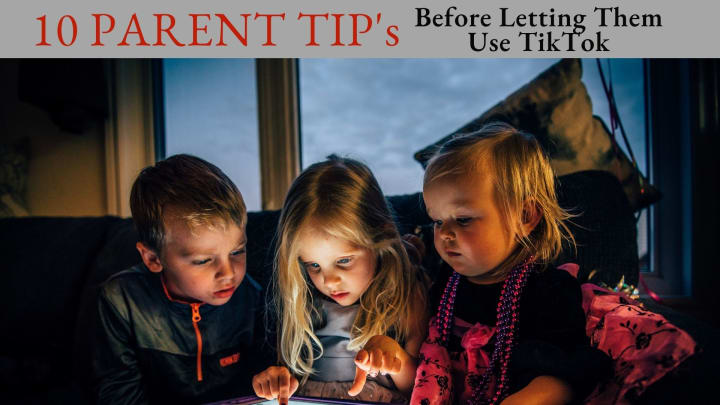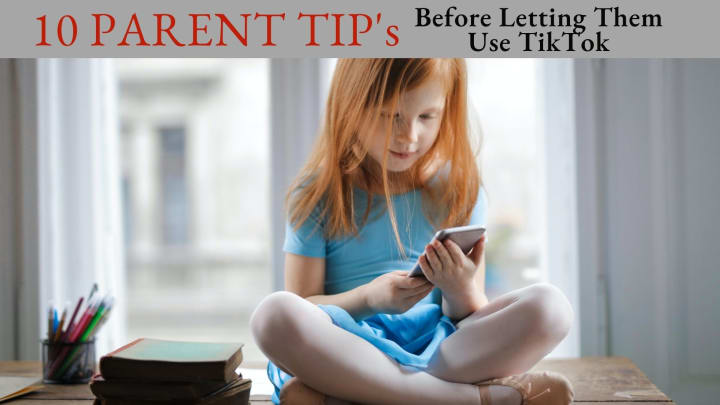TikTok's Top 10 Tips for Parents
Tiktok parental restrictions

introduction:
TikTok, the short-form video app, has quickly become one of the most popular social media platforms on which to share and view video content. While TikTok can be used safely by children and teenagers, it’s important to teach them how to use it in ways that are safe and responsible from the start. Here are 10 things every parent should teach their kids before letting them use TikTok, especially if they’re younger than 13 years old.
1) Watch it with your kid

TikTok's Top 10 Tips for Parents
1. Kids are curious about everything. They want to know how things work, and what's going on around them, and they love learning new stuff. So if you let your child use Tik Tok, you need to make sure that he/she knows the rules and regulations of the app. Here are some tips:
One way to get through to your child is by doing it yourself. If you’re going to let them use an app, make sure that you actually try it with them. Watch a few videos together, take screenshots of funny moments, and talk about what they’ve experienced. When they can see that you’re also an average user who makes mistakes sometimes, they will be less fearful of making mistakes themselves.
2) Don’t overreact to negative comments

watch it with your kid. Don’t overreact to negative comments Don’t try to control their social media accounts or delete any of their posts. This is a great opportunity for you and your child to have an open conversation about what they like and don’t like about using TikTok, and why some people may say mean things online. You can also talk about how to respond if someone says something mean, and what could happen if they respond in anger or lash out at others online.
3) Talk about their friends

Don’t overreact to negative comments. Talk about their friends Be aware of what they are watching and who they are following on TikTok. Talk about their friends and make sure you know who they are talking to on social media. Know how to report inappropriate content or behavior and make sure your child knows how as well. Set clear boundaries for usage, such as no phones at dinner time or no phones in bedrooms after a certain hour at night.
4) Discuss positive body image issues
Talk about their friends. Discuss positive body image issues. Encourage creativity and self-expression. Explain that there are always haters, but they shouldn’t let them get in their way. Remind them that they are loved for who they are inside, not outside. Stress safety and privacy settings. Make sure you have contact information for other parents of their friends so you can discuss behavior or anything else that comes up. Don’t forget to talk about how much fun using social media can be—and how quickly things can go wrong if they don’t follow good digital citizenship rules.
5) Remind them you have access to their account

Remind them you have access to their account. Don’t post pictures of them without permission. Discuss how privacy settings work and why they matter. Show how people can be mean on social media, but not in real life.
Education is a great responsibility that parents must assume when they decide to bring a child into this world, whether or not they want children is irrelevant – as parents, we are expected to educate our children from birth up until adulthood (if possible).
6) Engage in commenting and liking posts yourself
Make sure they know that everything is public. Explain why using a real name is important for safety reasons. Keep an eye on what they are doing, but don’t be too strict. Encourage them to post only photos that reflect who they really are and not just selfies or edited pictures of themselves. Discuss privacy settings and how they can control who sees their content. Explain how people can add them as friends if they want to follow their content.
7) Assess how they are with social media accounts
Assess how they are with social media accounts What should I teach my kids before letting them use TikTok? Watch it with your kid. Don’t overreact to negative comments. Talk about their friends. Discuss positive body image issues. Remind them you have access to their account. Engage in commenting and liking posts yourself. Assess how they are with social media accounts What should I teach my kids before letting them use TikTok? Watch it with your kid. Don’t overreact to negative comments. Talk about their friends. Discuss positive body image issues. Remind them you have access to their account.
8) Don’t be fake on any social platform
childhood training
Assess how they are with social media accounts. Don’t be fake on any social platform. Talk about privacy settings. Do not allow strangers to contact them via private messages or public comments. Remember, if you don’t want others to see it, then don’t post it! Encourage face-to-face interaction instead of virtual interaction when possible. Be aware of which apps they have downloaded and what features those apps offer (such as location tracking).
9) Explain who will see the videos
Tik Tok has become a global phenomenon in recent years. With millions of users around the world being exposed to content from this app daily, many parents have expressed concerns about what kind of content their children can view online. Many parents worry about inappropriate messages and images that may appear on this site, thus leading to cyberbullying and depression among teenagers.
10) Discuss why they would want to join TikTok as an adult
Many parents worry about inappropriate messages and images that may appear on this site, thus leading to cyberbullying and depression among teenagers.
Many people think that tik-toke is a good way to learn Chinese, but here we are going to show you
About the Creator
Early childhood training and learning
Children training; Children are facing an unprecedented number of challenges, This can be achieved through early childhood development and learning






Comments
There are no comments for this story
Be the first to respond and start the conversation.